#in accordance with instagram's policy that 'sex offenders are prohibited from using the service'
Text
Reminder that Seungri is a sex offender. Convicted and registered.
As some of you may be aware, Seungri was recently released from prison after serving a criminally short sentence of just 18 months for the commission of 9 crimes ranging from economic (financial) crimes, crimes of violence, and sex crimes.
That's right. Sex crimes.
In his sentencing hearing in August 2021, at the conclusion of the first trial in the Lower Military Court, just before he was whisked away to prison, the judge explained to Seungri that he would be subject to "registration of personal information related to sex crimes." See below:
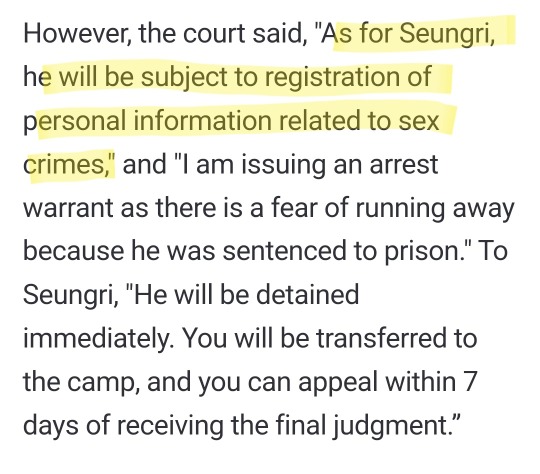

This was not widely reported, or even given much attention, with most of the media's focus being on the 3-year prison term and accompanying fine related to gambling. (Surprisingly, it did make it into Soompi's coverage, but I've reached my image limit on this post so here's a link to the report instead.)
Side note: as expected, his stans did not discuss this openly (or at all), and even their big "trusted translator" accounts either glossed over it or omitted it from their translations altogether, so many of his international supporters were unaware.
In the second trial with the High Court (first appeal), in which Seungri pleaded guilty to all charges (except for habitual gambling which he appealed again, hoping to lower it to "occasional" gambling, a lesser charge... he was unsuccessful with that, by the way), the court granted him leniency, cutting his prison term in half and forgiving the nearly $1 million fine. A generous reduction in punishment simply for saying, "I'm guilty, I'm sorry, go easy on me."
At the time, I couldn't find any information on whether or not the registration requirement for sex crimes remained in place. Even after the Supreme Court finalized everything in May of last year, there seemed to be no mention of it.
Now, however, days after his release from prison and return to society, we finally have confirmation:
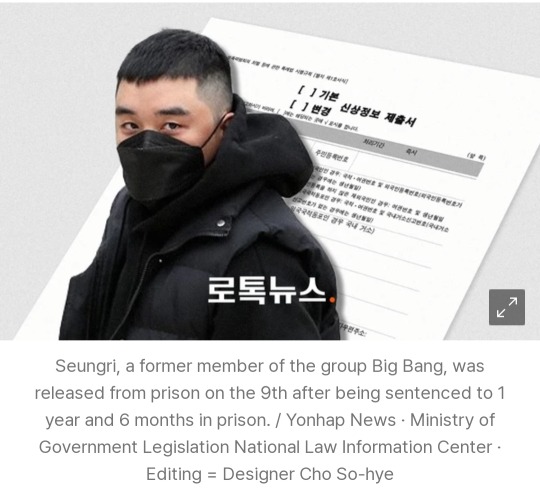
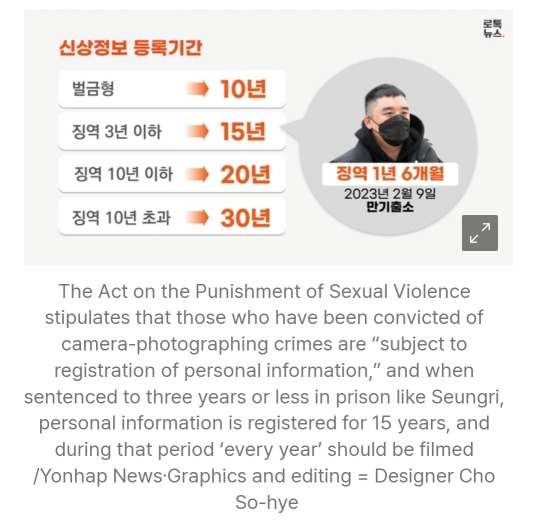

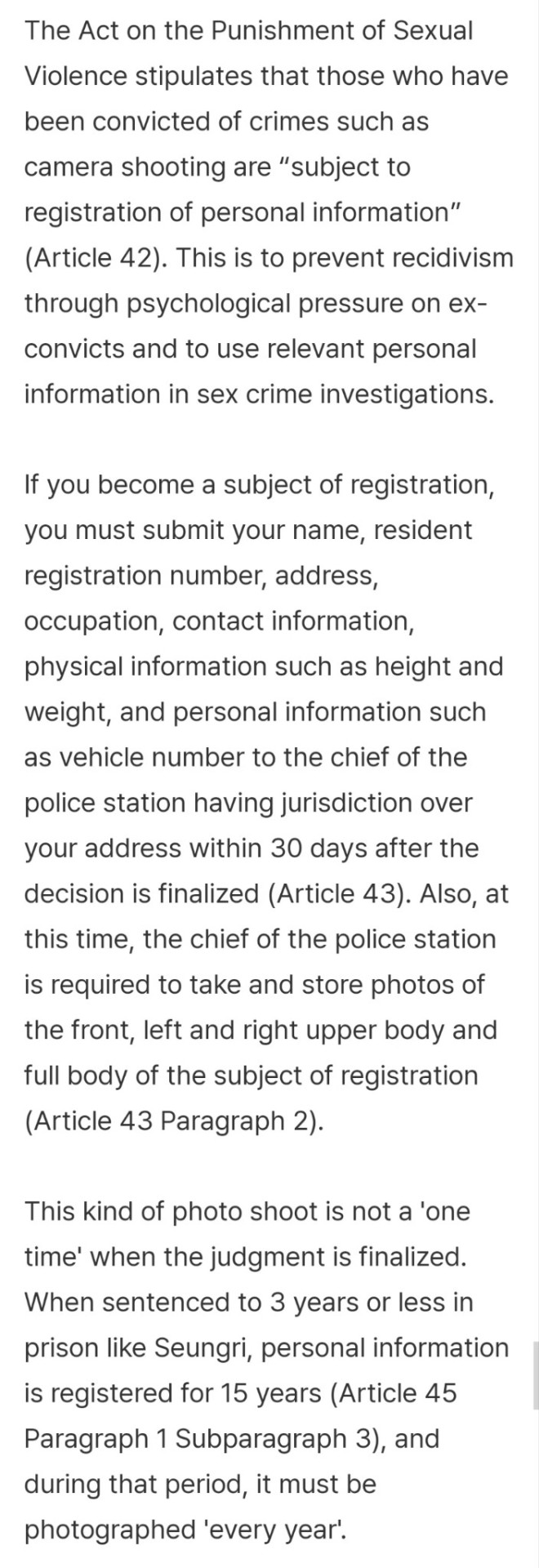
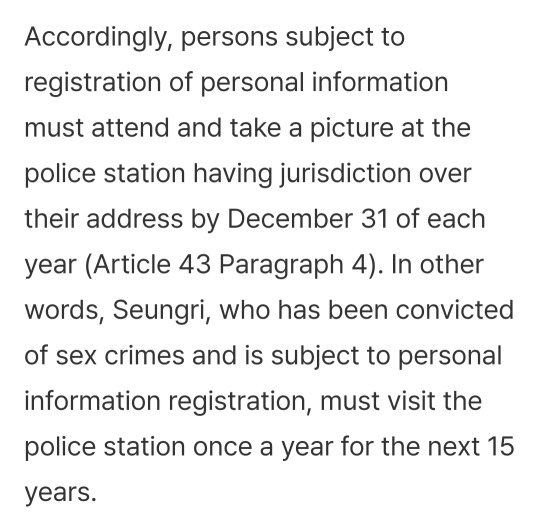
Required to register but exempted from disclosure. More on that below:
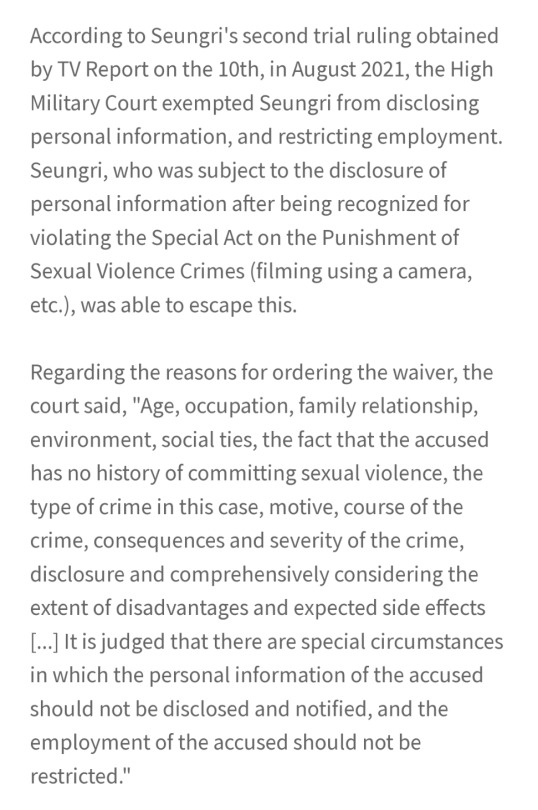

In short, Seungri is a registered sex offender required by law to submit (and keep current) his personal information to the authorities. He must also return each year to the local police station having jurisdiction over his home address and have updated mugshots photos taken -- once a year, every year, for the next 15 years. To put this into perspective, they'll be keeping tabs on him until he's in his late 40s.
So, yes, his information is registered. However, at the judge's discretion he was exempted from disclosure. This means his personal information (such as home address) will not be available, i.e., publicly searchable, on South Korea's online sex offender registry. Police will have access to this info. The public will not.
What was his violation of the Act on Special Cases Concerning the Punishment of Sexual Crimes? Well, we knew he had been charged with distributing some form of illegally filmed sexual material, also known as hidden camera footage or molka. It was described as being a photo of women, in bed, naked -- and, importantly, photographed from behind, which raises the question of consent.
Seungri admitted in 2019 to sharing something in a group chatroom, as there was chat evidence of this that could not be disputed. However, he challenged the notion that he'd taken the photo himself, claiming he'd received it from someone else. He later took it a step further and disputed the nature of the photo altogether by trying to pass it off as a "business advertisement" sent to him in a "spam text message" from an employee of an adult entertainment business. For publicity purposes.
The court rejected his excuse explanation for the photo and deemed him guilty of distributing illegally filmed footage. But as for who took the photo, whether it was Seungri or someone else, the court's decision didn't seem especially clear to me... until now, thanks to JTBC recently reporting details from the ruling:

The KKT chat log, made public in 2019, did not support Seungri's claim. The testimony of other members of the chat, when questioned in court about the photo they received from Seungri, did not support it either.
So much for his fans' stubborn insistence that he "wasn't in the molka chats." Thanks to the chat evidence, court docs from Jung Joonyoung's ruling, and Seungri's own admission in an interview with Chosun Ilbo, we've known for years that Seungri not only knew about his friends' molka habits but received such things from them directly and even reacted to them with amusement (laughter). Now, with the detailed results of Seungri's court proceedings before us, we can be certain that he took part in the practice too.
#the women in the photo may have been prostitutes... which to be clear doesn't make it good#but it is my sincere hope that they weren't fans#which I feel would make it so much worse#seungri#lee seunghyun#sex crimes#burning sun#and yes this is also the reason for his forced removal from instagram last year#in accordance with instagram's policy that 'sex offenders are prohibited from using the service'#along with the prostitution mediation charge which is also a class of sex crime in korea#seeking it for himself is not as serious in the eyes of the law but arranging it for others is
63 notes
·
View notes
Text
From Wired.com author Paris Martineau
TUMBLR WAS NEVER explicitly a space for porn, but, like most things on the internet, it is chock full of it anyway. Or at least it was. On Monday, to the shock of the millions of users who had used the microblogging site to consume and share porn GIFs, images, and videos, Tumblr banned the “adult content” that its CEO, David Karp, had defended five years prior. In the hours after the announcement, sex workers panicked, users threatened to leave, and—in classic Tumblr fashion—online petitions calling for change gained hundreds of thousands of signatures. But Tumblr’s porn ban isn’t about porn or Tumblr at all, really. It’s about the companies and institutions who wield influence over what does and doesn’t appear online.
When Melissa Drew, an adult content creator and model, logged in to Tumblr Monday afternoon, she was greeted by a deluge of unfamiliar posts and notifications. Her usual feed, perfectly curated after nearly a decade of tinkering, was awash with panicked posts from fellow adult models, memes about the policy change, and goodbye posts. Drew’s personal blog, which she had relied on as a public-facing way to tease the content available to her Patreon subscribers, was lit up with notifications from Tumblr informing her that most of her posts violated the new rules.
When Yahoo bought Tumblr for $1.1 billion in 2013, critics warned that premium advertisers wouldn't exactly be clamoring to run ads in a sea of porn. Yahoo CEO Marissa Mayer disagreed, arguing that targeting tools would keep content that isn't "brand-safe" (read: porn) away from ads. In an interview shortly after the acquisition, Karp doubled down on the platform’s openness to porn. “When you have … any number of very talented photographers posting tasteful photography,” said Karp, “I don't want to have to go in there to draw the line between this photo and the behind the scenes photo of Lady Gaga and like, her nip."
But the nip line has indeed been drawn, and it’s a doozy. Though Tumblr’s Monday announcement had technically only prohibited depictions of sex acts, “human genitalia,” and “female-presenting nipples,” a much wider swath of Drew’s feed was quickly caught up in the ban. “I had everything from nude, censored nudity, and lingerie photos flagged,” she told WIRED. “I still haven’t dealt with removing all of them yet—I just sort of heavy sighed and closed the tab.”
Safe Space
In interviews and messages with WIRED, more than 30 sex workers, porn consumers, and creators on Tumblr lamented the loss of what they described as a unique, safe space for curated sexually themed GIFs, photos, and videos. Many users who had used the microblogging site as their primary source for porn were at a loss when asked where they would go after Tumblr’s ban on “adult content” goes into effect on December 17. For the thousands of sex workers who used the site to share their own explicit content in a controlled, relatively contained manner—not to mention the countless others who used that content to fill the hyper-curated feeds of some of the site’s most popular porn blogs—the crackdown’s consequences are even more difficult to unpack. And researchers say the ban could shrink Tumblr’s user base, which already appears in turmoil over the decision.
The move comes less than two weeks after Apple pulled Tumblr from the iOS App Store after child pornography was found on the site. Though the offending illegal content was removed quickly, according to Tumblr, the app has yet to return to the App Store (it was never removed from the Google Play Store). In its most recent blog post, Tumblr stated that its longstanding no-tolerance policy against child pornography should not be conflated with the move to ban adult content. The latter, Tumblr argued, was inspired by a drive to create “a better Tumblr.” But these sorts of decisions aren’t made in a vacuum.
In March, Congress passed the Fight Online Sex Trafficking Act and the Stop Online Sex Trafficking Act (or FOSTA-SESTA for short). Lawmakers hailed the law as a means to give prosecutors more tools to combat combat sex trafficking. But the statute also tinkered with a bedrock provision of internet law, opening the door for platforms to be held criminally and civilly liable for the actions of their users. The law’s passage immediately led to the closure of several sex-work-related online venues, such as Craigslist’s personals section, numerous subreddits, and Patreon’s support for adult creators.
In interviews, more than a dozen sex workers told WIRED that the support and openness of adult-content creators on Tumblr had attracted them to the site. They described the site as notably more empowering and friendly than more traditional venues for explicit content, like PornHub, and relished Tumblr’s freedom and opportunity for virality. Many used the site to promote their paid content on other sites, interact with fellow sex workers, and screen clients.
Liara Roux, a sex worker and online political organizer, told WIRED via email that the options for finding adult content online are diminishing, and consolidating with big companies “and away from community generated content and independent creator friendly platforms." This, Roux says, is dangerous: "As mainstream sites slowly remove sexual content, which often is how queer and other marginalized communities are able to connect, it will become difficult for both sex workers and these communities to have an online space to exist."
App Store Sway
The ubiquity of the App Store gives Apple considerable influence over online content. Historically, Apple has taken a sex-negative approach to policing, with former CEO Steve Jobs once famously stating that “folks who want porn can buy an Android phone,” but the company’s influence extends beyond the iOS sphere. In the days after it was delisted from the App Store, Tumblr ramped up its moderation efforts, erroneously deleting numerous SFW and NSFW Tumblr accounts unrelated to child exploitation and abuse, and pushed out an update for its Android app that forced all users to have “safe mode” toggled on, restricting access to explicit content. Then came the porn ban.
Apple’s App Store review guidelines prohibit apps "with user-generated content or services that end up being used primarily for pornographic content.” The key word here is “primarily,” as all popular social media platforms are rife with porn, but Apple mostly seems to care about how easily accessible it is. Case in point: Apple pulled a number of Reddit apps from the App Store in 2016, citing issues with an NSFW content toggle, which, when activated, could be used to view pornographic content. The iOS Reddit apps currently available on the App Store have built-in features that prohibit porn subreddits from appearing in search, and make it extremely difficult for users to find NSFW content in-app without labor-intensive workarounds.
Tumblr likely could have instituted a similar content-censorship-based workaround, but it didn’t. Instead, it has gone with what appears to be an all-out-ban of “photos, videos, or GIFs that show real-life human genitals or female-presenting nipples, and any content—including photos, videos, GIFs and illustrations—that depicts sex acts.” Photos of nipples that appear to belong to a female-identifying person—which may be a difficult category to define, judging by the attempts of other platforms, like Instagram, to do the same—may be permitted so long as they are shared as part of a non-sexual context like a post showcasing breastfeeding, pre- or post-birth, post-mastectomy, or gender confirmation surgery. Written erotic content, along with nudity in art—“such as sculptures and illustrations,” says Tumblr—are alright, too. To draw the distinctions, the company says it will use a mix of machine learning and human moderation, and that all appeals for posts erroneously flagged as adult will be reviewed by “real, live human eye(s).”
Tumblr users are already finding problems with the flagging system. Classical paintings of Jesus Christ were flagged, as were photos and GIFs of fully clothed people, patents for footwear, line drawings of landscape scenes, discussions about LGBTQ+ issues and more. “In its early stages, Tumblr is using a poor system for flagging content,” says Abigail Oakley, a researcher at Arizona State University with a focus on Tumblr communities. “Having a certain number of flags on your blog (regardless of their validity) also removes the blog from Google searches, which is another form of censorship.”
Casey Fiesler, an assistant professor at the University of Colorado who specializes in fandom culture on platforms like Tumblr, thinks Tumblr’s crackdown will likely lead to a mass exodus of users. Fielser also worries that the LGBTQ people and sexual assault survivors who use Tumblr as a space for support could inadvertently be affected by the ban. “Even for fandom participants who don't create adult content themselves, this kind of policy feels like an attack on the community,” she said.
Consumers and creators of porn on Tumblr aren't entirely sure where they'll go next. While many sex workers mentioned Reddit and Twitter as two popular alternatives, they lamented the platforms' lack of community and sex-positive culture. Similarly, more than a dozen people who said they had used Tumblr as their primary source of porn for years praised the site's social, judgment-free culture, which many cited as helping them understand their sexual orientation. "The technology is out there to allow users to continue browsing a variety of porn from independent producers, but it will require a shift back in how people think of the internet," said Roux, the sex worker and political organizer. "I'm hoping these kinds of controversies encourage content creators to take as much control over their distribution channels as possible and inspires tech companies to solve the issue of bringing content to users without hosting the content themselves."
1 note
·
View note